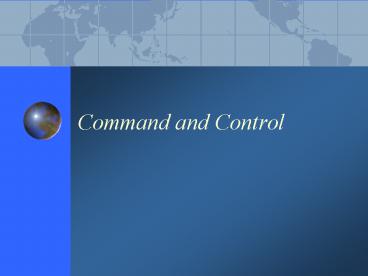Command and Control - PowerPoint PPT Presentation
1 / 26
Title:
Command and Control
Description:
... Trafalgar, Nelson used 3 signal flag hoists to coordinate movements of ... phone calls and 152,000 radio messages per day to coordinate coalition forces. ... – PowerPoint PPT presentation
Number of Views:87
Avg rating:3.0/5.0
Title: Command and Control
1
Command and Control
2
I think of Command and Control as two different
things the more control a senior places on a
subordinate, the less command capability he has.
The more a commander is capable of commanding,
the less control he requires.
- LtGen Cheatham, USMC
3
Concept
- The means of influencing the actions of our
forces and imposing our will on the enemy. - Enables Naval commander to understand the
situation in battlespace, select a course of
action, issue orders, monitor, execute on and
evaluate results. - Without it organized military ops are impossible
4
CC Purpose
- Used to collect, process, disseminate, and
protect the information needed to gain knowledge
of the situation, make decisions, and coordinate
forces in pursuit of a common objective - Naval commander must gather and use information
better and faster than his adversary
5
Command and Control
- Refers to both the process and to the system by
which the commander decides what must be done and
sees that the decisions are carried out. - Process - planning, directing,m coordinating and
controlling of forces and operations - System - personnel, equipment, coms, facilities
and procedures employed.
6
Evolution of CC
- 1805 Battle of Trafalgar, Nelson used 3 signal
flag hoists to coordinate movements of British
Fleet - 1991 Schwarzkopf used 700,000 phone calls and
152,000 radio messages per day to coordinate
coalition forces.
7
Definitions
- Command - function of authority, responsibility
and accountability - Control - means by which a commander guides the
conduct of operations - Communication - the dissemination of information
to the parties that need it to make decisions
8
Definitions
- Stategic - big picture, affects entire theater of
operations. What you are planning to do. - Tactical - localized small unit issues.
Specifically how you are planning to do it.
9
Environment
- CC is shaped by 2 factors that define the
environment of every military operation - Uncertainty difference btwn what we know and
what we want to know about any situation - How do we reduce uncertainty?
- Knowledge / Information
- Time
- info is perishable
- tempo
10
Human
- Authority - delegated
- Official - rank, position (by law)
- Personal - influence, charisma (experience, rep,
char, example) - Responsibility
- Accountability
11
Command
- Establish Goal
- Inspire subordinates (Intent or Unity of
Effort)
12
Control
- Monitoring
- Influencing
13
C2 works to exploit
- Uncertainty
- Cognitive Hierarchy
- Time
- OODA Tempo
14
We must expect our enemy to act unpredictably.
The nature of combat will make absolute certainty
impossible to attain.
15
Sources of information are imperfect (Subject
to manipulation and perception)
16
Command and Control becomes a race against
timeGenerate Tempo
17
Process of CC
- Transform an idea into action
- Naval commander makes a decision and exercises
authority over subordinates to accomplish mission
18
Decision Making
- Based on orientation of situation
- Orientation results from
- process of turning data into knowledge
- All level of COC must understand commanders
intent - unity of effort
19
Decision Making Theory
- Knowledge is a function of information
- Increased knowledge brings increased decision
making ability - Point of diminishing returns
- Two processes
- Analytical
- Intuitive
20
Decision Making Process
- Analytical process
- several options generated
- weigh advantages/ disadvantages of each
- tends to be thorough but time consuming
- Intuitive process
- relies on experience of commander
- finds first solution not best solution
- more than one solution meets a problem
- Which is better?
21
Methods of Control
- Balance between directing operations and granting
freedom to subordinates - Detailed control (tight reign)
- CC is centralized
- vertical information flow
- Mission control (loose reign)
- decentralized and flexible
- horizontal information flow
- Which is better
22
Methods of Control
- Detailed
- centralized
- vertical
- procedures
- not best for dynamic situation
- Mission
- decentralized
- horizontal
- intent
- good for dynamic situtation
23
Decentralization
- Advantage
- subordinates have understanding of mission and
freedom of action - spontaneous cooperation of elements
- tempo of operations of heightened
- ability to deal with changing situations
- Demands more of naval leaders
24
Command and Control Systems
- Support (C4I)
- technology
- equipment
- Guidance
- leadership
- training
- organization
- doctrine
25
Leaders at every level must understand their
seniors intent, so they can exploit rapid
decision and execution cycles in conjunction with
broader efforts
26
A good plan violently executed NOW is better
than a perfect plan next week
Gen G. S. Patton Jr































